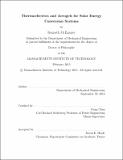Thermoelectrics and aerogels for solar energy conversion systems
Author(s)
McEnaney, Kenneth
DownloadFull printable version (3.907Mb)
Other Contributors
Massachusetts Institute of Technology. Department of Mechanical Engineering.
Advisor
Gang Chen.
Terms of use
Metadata
Show full item recordAbstract
Concerns about climate change, the world's growing energy needs, and energy independence are driving demand for solar energy conversion technologies. Solar thermal electricity generation has the potential to ll this demand. Solar thermal technology could also be used to displace fossil fuels in applications which require heat as an input. This thesis addresses the potential of two solar thermal technologies: solar thermoelectric generators and aerogel-based solar thermal receivers. Thermoelectrics are materials which produce a voltage when subjected to a temperature gradient. In a solar thermoelectric generator (STEG), sunlight heats one end of the thermoelectric materials, generating a voltage across the device. The voltage can be connected to a load and useful work can be extracted. By adding optical concentration and using higher-temperature materials, the power output and energy conversion eciency of STEGs can be increased. In this work, segmented thermoelectric generators (TEGs) made of bismuth telluride and skutterudite alloys are modeled, optimized, built, and tested. These TEGs achieve a heat-to-electricity conversion efficiency of 10.7% at a hot side of 550° C, the highest TEG eciency reported in this temperature range. From these TEGs, STEGs are built which achieve a sunlight-to-electricity conversion eciency of 5.7% at less than 60 suns, higher than the best reported literature values in this concentration range. With further improvements, it is projected that these STEGs will achieve 10% eciency at 100 suns. In any type of solar thermal system, heat losses from the system must be suppressed to achieve high eciency. Aerogels, which are stable ultra-low density foams, can suppress radiative and convective losses. It is shown that aerogel-based solar thermal receivers can increase the eciency of traditional solar thermal electricity and hot water generation. These results can help advance the field and expand the scope of solar thermal technologies.
Description
Thesis: Ph. D., Massachusetts Institute of Technology, Department of Mechanical Engineering, 2015. This electronic version was submitted by the student author. The certified thesis is available in the Institute Archives and Special Collections. Cataloged from student-submitted PDF version of thesis. Includes bibliographical references (pages 115-124).
Date issued
2015Department
Massachusetts Institute of Technology. Department of Mechanical EngineeringPublisher
Massachusetts Institute of Technology
Keywords
Mechanical Engineering.